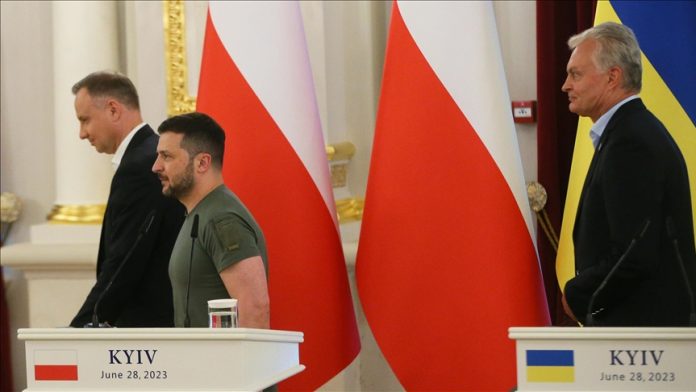Andrzej Duda, the president of Poland, arrived in Kyiv on Wednesday and had a meeting with Volodymyr Zelenskyy, the president of Ukraine, to go through preparations for the upcoming NATO Summit in July and the Russian threat to destroy the Zaporizhzhia Nuclear Power Plant.
The Office of the President in Warsaw released a statement on social media stating that the visit to Kiev (Kyiv) and discussions with President Volodymyr Zelenskyy were related to the Ukraine’s celebration of Constitution Day as well as consultations on recent front-line activities, including the threat of a Russian attack on the Zaporozhye (Zaporizhzhia) plant.
“Preparations for the July NATO Summit in Vilnius will also be discussed,” it continued.
The NATO leaders’ summit will be held in Vilnius, Lithuania, on July 11 and 12.
This is the Polish president’s fifth visit to Ukraine since the conflict began in February of last year.
The president’s visit to Ukraine is part of the Lublin Triangle, which also includes Lithuania, whose President Gitanas Nauseda visited Kyiv, ostensibly to further the country’s NATO membership ambition.
Ukraine wishes to be formally invited to join the 31-nation military alliance. However, NATO’s highest-ranking officials, including Secretary General Jens Stoltenberg, have downplayed Kyiv’s hopes, emphasising that such a decision is still premature.
Duda was in the Netherlands on Tuesday, where he highlighted the importance of the meeting in the Lithuanian capital. “We all know that given the security situation in Europe following Russia’s aggression against Ukraine, this will be a critical NATO summit,” he added.
He emphasised five key areas during the meeting with government officials: increasing defence spending among NATO members, supporting Sweden’s NATO accession, assisting Ukraine and bringing it closer to NATO membership, and developing a long-term approach to Russian political and economic threats.

